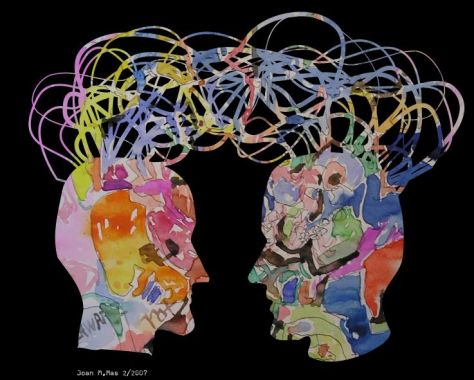This is the last post in series about the lessons my husband (NT) and I (aspie) have learned during the 25 years we’ve been married.
 Learn how to recognize your partner’s expressions of love
Learn how to recognize your partner’s expressions of love
Aspies and NTs speak completely different languages when it comes to expressions of love. You can either learn to translate your partner’s “love language” or you can spend the rest of your marriage wondering if this person you’re sleeping next to every night really, actually loves you.
How does this translation work? Like this:
The Scientist: “You don’t have to make my lunch every morning. I can pick something up in the cafeteria.”
Me: “I don’t mind. It only takes a few minutes and I know you’d rather have something healthy to eat. This way you don’t have to waste time waiting in line.”
The Scientist: “So you mean you make my lunch because you care about me, right?”
Exactly.

 Accept that there are things you’ll never understand about your partner
Accept that there are things you’ll never understand about your partner
No matter how long you live together or how much you love each other, there will be moments when you feel like your partner is the most incomprehensible person on Earth. The aspie and NT brains have key differences. The sooner you accept this, the less frustrated you’ll be when your partner does something that leaves you scratching your head.
There have been many times when The Scientist has given up on a conversation with the words, “I just don’t understand you.” It’s not that he isn’t trying. He’ll ask me lots of questions to try to zero in on an explanation for something I’ve done or said. He’ll wait semi-patiently while I sit mutely and stare off into the distance, unable to put words to what I’m feeling. He’ll repeat things back to me to see if he’s hearing me correctly. But no matter how many different ways I explain it, it still doesn’t make sense to him because we’re both starting from fundamentally different places.
This goes both ways. The day The Scientist told me that he feels something–a physical sensation of warmth was how he described it–when he says, “I love you” I was stunned. I tell him that I love him every day but I’ve never associated a physical feeling with those words.
I can logically understand what this physical feeling might be like, but I’ll probably never know exactly what he feels. By the same token, I can tell him that when I sit in a crowded restaurant, my brain is tracking the conversations at all of the tables within earshot, but I don’t think he can ever replicate that experience in his own head.
We can make educated guesses at what’s going on inside the head of our partner, but there will always be some experiences that we can’t truly understand.
 Have realistic expectations but don’t stop trying to grow and improve your relationship.
Have realistic expectations but don’t stop trying to grow and improve your relationship.
When faced with the day-to-day challenges of an aspie-NT marriage, it would be easy for both partners to simply give up in frustration. I can think of plenty of times when walking away would have been easier and less painful than trying to work things out.
Balancing realistic expectations–by both partners–with a concerted effort to improve can be a relationship-saver. Realistic expectations go both ways. The NT partner shouldn’t expect the aspie partner to morph into a typical person overnight. (The Scientist says he wouldn’t want this even it were possible.)
By the same token, the aspie partner shouldn’t expect the NT partner to simply put up with an endless barrage of unchecked aspie behavior. Knowing what can be changed and what can be tolerated is essential.
The second part of this equation is one that might draw some heat from aspies. I’m a firm believer in trying to improve my ability to function in an NT world. Before anyone jumps down my throat about the potential evils of assimilating, let me explain.
The day I explained to my husband about my Asperger’s, one of the first things he said was, “I love you exactly the way you are.” I treasure that and I know it’s not something he said just to make me feel better. He means it. But I also know that I’m hard to live with. I find myself hard to live with at times. So when I say I want to improve my level of functioning, it’s because I want to struggle less on a daily basis and because I want the people around me–the people I love–to struggle less. It has nothing to do with conforming to the expectations of an NT world and everything to do with making life less stressful and more enjoyable for myself and my family.














